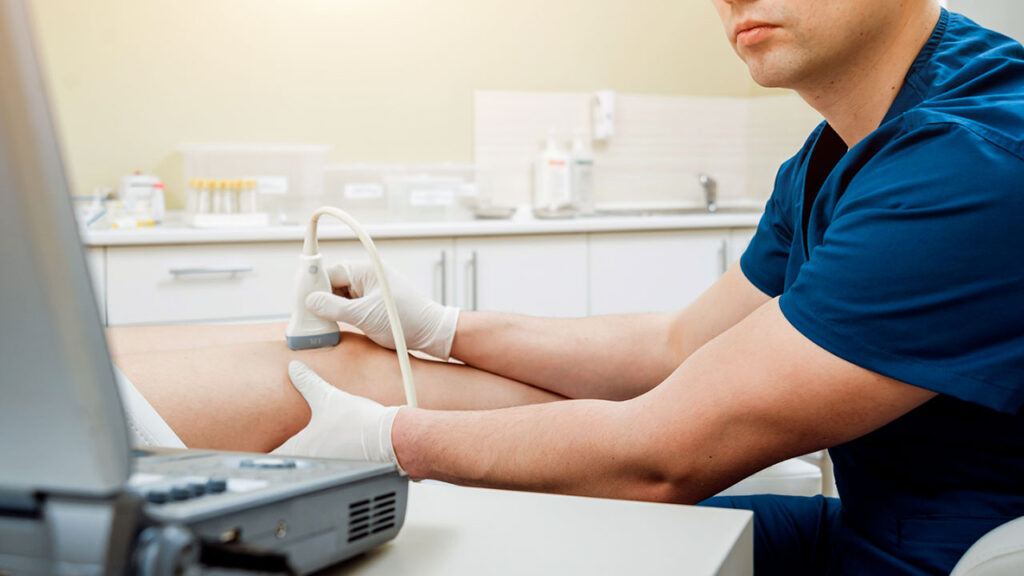What are Varicose Veins?
Varicose veins are veins that have become swollen or enlarged and are most often found in the legs. Varicose veins may occur close to the skin’s surface, appear as blue or dark purple lines, and sometimes have a twisted or bulging appearance. This condition is caused by the weakening of the valves within the veins, which results in blood pooling in the veins and stretching them out.

In some cases, varicose veins may only be a cosmetic concern, but in other cases, they can be indicators of more serious vascular disease. Symptoms of varicose veins other than their appearance may include aches in the legs, increased pain, stiffness after sitting or standing for prolonged periods, or cramping and swelling of the legs.
Risk factors for varicose veins include:
- Being female
- Family history
- Obesity
- Older age
- Limited movement
- Pregnancy
Vascular Ultrasound for Varicose Veins
In some cases, varicose veins may indicate more serious vascular disease such as deep vein thrombosis (DVT). DVT occurs when a blood clot develops within the veins and blocks or disrupts blood flow, and it usually occurs in one leg at a time. DVT can be serious because blood clots not only disrupt blood flow but can break off and move through the bloodstream to become lodged in the lungs, causing a pulmonary embolism.
A vascular ultrasound exam is the best way to diagnose any type of vascular disease including DVT. Vascular ultrasound is an ultrasound exam focusing on the vascular (circulatory) system, which is made up of the veins and blood vessels that carry oxygenated blood throughout the body. Ultrasound exams are fast, painless, and pose no known health risks.
Vascular ultrasound exams use Doppler technology, which involves high-frequency soundwaves to create images and videos of what is happening inside the body. A vascular ultrasound exam can determine the speed and direction of blood flow as well as the size and stiffness of veins. This type of ultrasound for varicose veins can confirm a varicose vein diagnosis by imaging any pooling of blood. The exam can also help determine if any blood clots are present.
A vascular ultrasound exam is often performed by a Registered Vascular Technologist (RVT). RVTs are trained to perform vascular ultrasound exams. During a vascular ultrasound exam, the RVT will use a handheld device called a transducer to press on the skin and gently compress the veins while viewing the resulting images and videos on a console. The ultrasound exam results would then be sent to a trained physician for interpretation, then to the patient’s doctor for final review and diagnosis.
Treatments for Varicose Veins
There are several treatment options for both varicose veins and DVT depending on each condition’s severity level. In some cases, varicose veins may not be very severe and simply pose a cosmetic concern. In other cases, they can be very painful and may even indicate DVT.
Treatments for Varicose Veins:
- Compression stockings
- Elevating the legs
- Exercise
- Laser treatment
- Surgery
- Vein injections
Treatments for DVT:
- Compression stockings
- IVC filters inserted in the vein
- Medications such as blood thinners
If you have concerns about varicose veins, talk to your doctor. Your doctor may recommend a vascular ultrasound to confirm a diagnosis and determine if another vascular disease is present, such as DVT. It’s important to remember that varicose veins are treatable, and complications are rare.
Guest Contributor: Jordan Galerkin
Sources:
- Deep Vein Thrombosis (DVT). Mayo Clinic. https://www.mayoclinic.org/diseases-conditions/deep-vein-thrombosis/symptoms-causes/syc-20352557
- Diagnosing Vascular Disease. University of Pittsburgh Medical Center Heart and Vascular Institute. https://www.upmc.com/services/heart-vascular/services/tests-procedures/vascular-disease-screening/diagnosing-vascular-disease
- Varicose Veins. Mayo Clinic. https://www.mayoclinic.org/diseases-conditions/varicose-veins/symptoms-causes/syc-20350643
- Types of Ultrasound: Doppler vs. Duplex. https://www.ultrasoundquotes.com/blog/doppler-vs-duplex/
